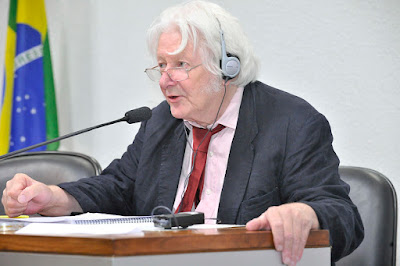Late last week, the Supreme Court of India struck a blow for transparency and accountability when it ruled unconstitutional a system of anonymous political donation.
In a 2017 law, India had adopted a system of "electoral bonds." These are not investment bonds. Rather, to make a political donation, a donor was required to buy a political bond from the State Bank of India, and the bank then gave the money to the indicated political candidate.
The bond system was adopted ostensibly to further transparency and accountability. By requiring all political donations to be processed by the state bank, regulators could ensure compliance with donor restrictions. The system was supposed, then, to balance donor anonymity—a legitimate extension of free speech rights—with anti-corruption regulation.
 |
P.M. Narendra Modi speaks to Pres. Biden at the G20, 2022. White House photo via Flickr |
The India Supreme Court ruled that the electoral bond system is incompatible with the fundamental "right to know" (RTK), that is, with Indian norms of freedom of information (FOI). I wrote in 2017 about India's Right to Information Act (RTIA), a statutory instrument akin to the U.S. Freedom of Information Act (FOIA). FOI, or access to information (ATI), for India, though, is in sync with contemporary norms elsewhere in the world, notably Europe, where RTK or FOI is recognized as a human right. Courts such as the India Supreme Court, like the Court of Justice of the EU, therefore have the constitutional enforcement power of judicial review.
The India Supreme Court, as it often does on important constitutional questions, surveyed other common law nations. And despite our weak and non-textual recognition of FOI as a constitutional right, the United States earned several mentions. Saliently, the court cited the old stalwart, Buckley v Valeo (U.S. 1976), for "concern of quid pro quo arrangements and [the] dangers to a fair and effective government. Improper influence erodes and harms the confidence in the system of representative government." Disclosure, the India court reasoned,
helps and aides the voter in evaluating those contesting elections. It allows the voter to identify interests which candidates are most likely to be responsive to, thereby facilitating prediction of future performance in office. Secondly, it checks actual corruption and helps avoid the appearance of corruption by exposing large contributions and expenditures to the light of publicity. Relying upon Grosjean v. American Press Co. (U.S. 1936), [disclosure] holds that informed public opinion is the most potent of all restraints upon misgovernment. Thirdly, record keeping, reporting and disclosure are essential means of gathering data necessary to detect violations of contribution limitations.
For a more recent vintage, the India court cited Nixon v. Shrink Missouri Government PAC (U.S. 2000):
[T]he Supreme Court of the United States observes that large contributions given to secure a political quid pro quo undermines the system of representative democracy. It stems public awareness of the opportunities for abuse inherent in a regime of large contributions. This effects the integrity of the electoral process not only in the form of corruption or quid pro quo arrangements, but also extending to the broader threat of the beneficiary being too compliant with the wishes of large contributors.
So the India court fairly observed that the U.S. Supreme Court has been willing to unmask donors, even if the Supreme Court has lately been less than enthusiastic about regulations it once, in a Buckley world, approved. Indeed, even as the U.S. Supreme Court rejected the disparate treatment of corporations in Citizens United v. FEC (U.S. 2010), it approved of disclosure requirements.
The India court found support for disclosure in defense against corruption in other national regimes, too, for example, in Canada and Australia. Alas, there, comparisons with the United States deteriorate in practice. The India Supreme Court did not mention the dark (money) side to America's affair with transparency. Read more at the Brennan Center for Justice.
The case is Association for Democratic Reforms v. India (India Feb. 15, 2024).










